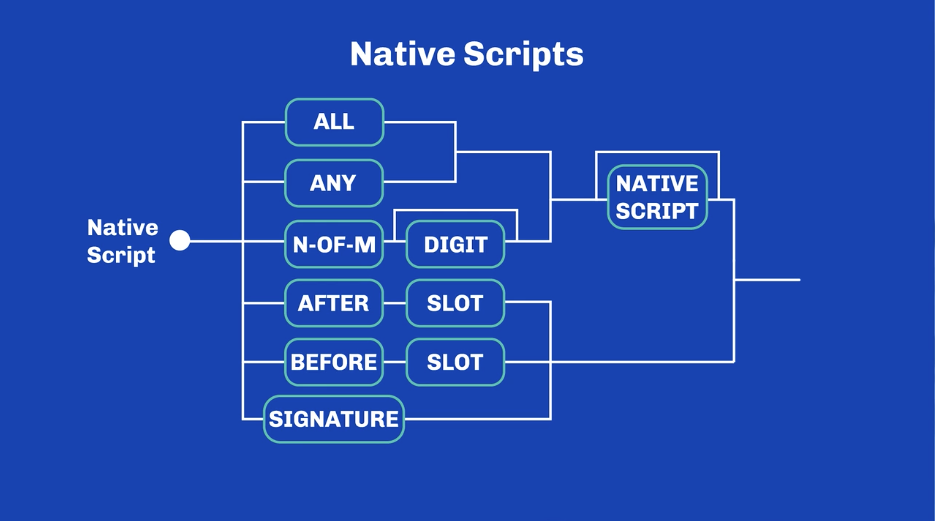Native scripts are simpler, non-Turing-complete scripting solutions on Cardano. They are used primarily for multi-signature transactions and simple, pre-defined logic that does not require complex computation. Native scripts are processed directly by the Cardano ledger and have limited functionality compared to Plutus scripts.

Key Characteristics:
- Non-Turing-Complete: Native scripts do not support loops, recursion, or complex logic, meaning they are designed for simple and predictable operations.
- Transaction-focused: They are typically used to define conditions for multi-signature transactions, time-locked transactions, or similar straightforward requirements.
- Ledger-based: Native scripts run directly within Cardano’s UTxO model and are processed by the ledger without requiring a virtual machine or complex computational resources.
- Low Resource Consumption: Because they lack complex logic, native scripts consume fewer resources, making them efficient in terms of both execution time and transaction fees.
Example Use Cases:
- Multi-Signature Transactions: Native scripts can be used to require multiple parties to sign a transaction before it is valid.
- Timelocks: You can use native scripts to enforce time constraints on transactions (e.g., ensuring that funds are only spendable after a certain block height).
- Basic Logic: Simple conditions such as “A or B must sign” or “funds can only be spent after a specific time” are handled by native scripts.
Example:
A simple native script could require that either two specific addresses sign a transaction or that a specific time period has passed before the transaction becomes valid.
Native Script Code Example
Native scripts are simple and are used for tasks like multi-signature or time-locking. Here’s an example of a multi-signature native script where the transaction requires either Alice or Bob to sign it for it to be valid.
Real-World Example: Multi-Signature Native Script (JSON format)
{
"type": "any",
"scripts": [
{
"type": "sig",
"keyHash": "ed25519_pk1yqdm9czr44d0tpwyw6fg0znf0lveaxt6e0p58qxj0x3k6fdpzrlsd5vsl9" // Alice's public key hash
},
{
"type": "sig",
"keyHash": "ed25519_pk1s4hdm9azczbscy0lrk9fwpxdsndaxj9zj9f2sm6lhgj34cnksyfj0lpfwy" // Bob's public key hash
}
]
}Explanation:
- “type”: “any”: This means that the script will be satisfied if any of the conditions listed is met.
- “sig”: Specifies that the condition is based on a signature (multi-signature).
- “keyHash”: The public key hash of Alice and Bob. Either one can sign the transaction for it to be valid.
This script is simple and used for multi-signature transactions. It doesn’t have complex logic like loops or recursion and is processed directly by the Cardano ledger.
Conclusion
- Native scripts are ideal for simpler tasks like multi-signature transactions and time-locked transactions. They are efficient, but limited in terms of functionality.
- Plutus scripts offer full programmability and are designed for more complex decentralized applications, enabling a wide range of smart contract functionalities on Cardano.
Both native and Plutus scripts serve essential roles within Cardano’s ecosystem, with native scripts providing straightforward, low-cost solutions, while Plutus scripts enable more sophisticated decentralized applications and smart contracts.

Leave a Reply